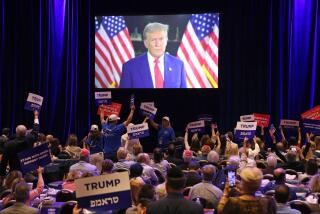Dukakis Vows Push for Arab-Israel Talks : Promises Support for Jewish State in New York City Appearance
- Share via
NEW YORK — Speaking to the nation’s most influential Jewish leaders Monday in the nation’s most heavily Jewish city, Democratic presidential candidate Michael S. Dukakis pledged to “use every ounce of energy we have” to persuade Arab leaders to enter into direct negotiations with Israel.
In a strongly worded address to the Conference of Presidents of Major American Jewish Organizations, Dukakis promised steadfast support for the defense of Israel and blamed Arab leaders for the continued violence in the Israeli-occupied West Bank and Gaza Strip.
“It is, regrettably, Arab leaders themselves who have time and again rejected the chance to sit down with Israel and negotiate peace,” he said.
Tells of Meeting Survivor
The Massachusetts governor made a point of introducing his wife, Kitty, who is Jewish and a former member of the President’s Commission on the Holocaust. And he told the audience of about 75 how he and his wife cried on meeting a rabbi who was the only Jew from Salonika, Greece, to survive the Nazi death camps.
Although Dukakis’ 30-minute speech was warmly received, he surprised many in the audience when, in reply to a question, he specifically declined to oppose creation of a separate Palestinian state.
Instead, Dukakis cited President Jimmy Carter’s Camp David Middle East accords of 1978, which reserved judgment on the issue. He told the crowd that the question should be left to future negotiations.
“It will have to be the parties themselves that make that judgment,” he said.
Several members of the audience expressed disappointment, noting that the Reagan Administration, and one of Dukakis’ Democratic rivals, Tennessee Sen. Albert Gore Jr., have come out in opposition to a Palestinian state.
‘Not Happy With Answer’
“He avoided the question,” complained the questioner, Rabbi Israel Miller, senior vice president of Yeshiva University. “I was not happy with his answer.”
“I felt his answer was too simple,” agreed Charlotte Jacobson, treasurer of the National Jewish Fund, who asked the question a second time. “It needs fuller thought.”
But most in the audience gave Dukakis high marks overall. “He certainly has to be described as a friend of the state of Israel and a friend of Soviet Jewry,” said Morris Abram, chairman of the conference. “He has a large measure of support within the Jewish community.”
“I think Gov. Dukakis did what he had to do,” agreed Lewis Weinstein, a former chairman of the group. “Some firebrands won’t be happy about the Palestinian question. But I think he said what I expect a strong presidential candidate to do. Why should he set up obstacles for future negotiations?”
With New York’s primary next Tuesday shaping up as the contest that could determine the Democratic presidential nomination, Dukakis’ aides acknowledged a great deal was riding on his appearance here. Jews are expected to cast an estimated one-fifth to one-third of the state’s primary votes.
Criticized Jackson
Gore’s appearance before the group last month drew considerable publicity, partly because he criticized Dukakis for a lack of foreign policy experience and partly because he criticized rival Jesse Jackson for an insufficient commitment to Israel.
Jackson initially declined an invitation to speak, but a conference spokesman expressed hope that Jackson would accept a renewed invitation. Jackson remains unpopular with many in the group, however, and one man stood to call him “a racist in reverse” and an “anti-Semite.”
With Dukakis leading Jackson in the polls, at least one of Gore’s supporters here said he would support Dukakis in an effort to keep Jackson from winning. “If I did not have Jackson in front of me, I’d vote for Gore,” said Ruby Gruenbaum, president of the National Council of Young Israel.
Dukakis apparently avoided the flap that dogged Democrats Walter F. Mondale and Gary Hart during the New York primary in 1984. Both men promised to move the U.S. embassy from Tel Aviv to Jerusalem, as Israel long has advocated, but fought over who deserved credit for raising the issue. The Democratic Party platform also has endorsed moving the embassy.
When Dukakis was asked about Jerusalem, however, his answer rambled somewhat. At first he said “the issue has to be the subject of negotiations.” A moment later, he added: “Jerusalem is the capital, it should be the capital.”
Jerusalem Question
The answer apparently was sufficient, however, for those listening. “He said there’s no question Jerusalem should be the capital of Israel,” said Kenneth Bialkin, former chairman of the conference. “That’s pretty good.”
In his speech, Dukakis said there can be “no place” at the bargaining table for the Palestine Liberation Organization “unless it renounces terrorism in word and deed,” and until it accepts U.N. resolutions that guarantee Israel’s right to exist.
“Real progress toward peace will not be made until Arab leaders are willing to negotiate directly; until they accept Israel’s right to exist, and to exist within borders that are secure and defensible,” he said.
Dukakis said he would oppose arms sales that would endanger Israel, “particularly the sale of sophisticated weapons” to Arab nations at war with Israel or unwilling to participate in the peace process. But he said there are limits to what the United States can or should do.
“We’re not going to impose a Pax Americana on the Middle East,” he said.
More to Read
Sign up for Essential California
The most important California stories and recommendations in your inbox every morning.
You may occasionally receive promotional content from the Los Angeles Times.











